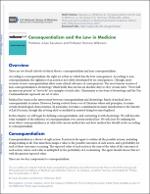Chapter 4 Consequentialism and the Law in Medicine
Author(s)
Savulescu, Julian
Wilkinson, Dominic
Collection
WellcomeLanguage
EnglishAbstract
There are two broad schools of ethical theory: consequentialism and non-consequentialism.
According to consequentialism, the right act is that act which has the best consequences. According to non-consequentialism, the rightness of an action is not solely determined by its consequences. (Though, most versions of non-consequentialism allow some ethical relevance of consequences). The most famous version of non-consequentialism is deontology, which holds that one has an absolute duty to obey certain rules. “Never kill an innocent person” or “never lie” are examples of such rules. Christianity is one form of deontology and the Ten Commandments represent one set of rules.
Medical law exists at the intersection between consequentialism and deontology. Much of medical law is consequentialist in nature. However, having evolved from a set of Christian values and principles, it retains certain deontological characteristics. In particular, it retains a commitment in many jurisdictions to the Sanctity of Life Doctrine, though this is being shed or modified as assisted dying becomes legalised.
In this chapter, we will begin by defining consequentialism, and contrasting it with deontology. We will describe some examples of the influence of consequentialism over current medical law. We will close by outlining the areas where consequentialism is at odds with current medical law and how medical law should evolve according to consequentialism.
Keywords
consequentialism; medical lawISBN
9780198796558Publisher
Oxford University PressPublisher website
https://global.oup.com/Publication date and place
Oxford, 2019Grantor
Classification
Law
Medicine and Nursing


 Download
Download